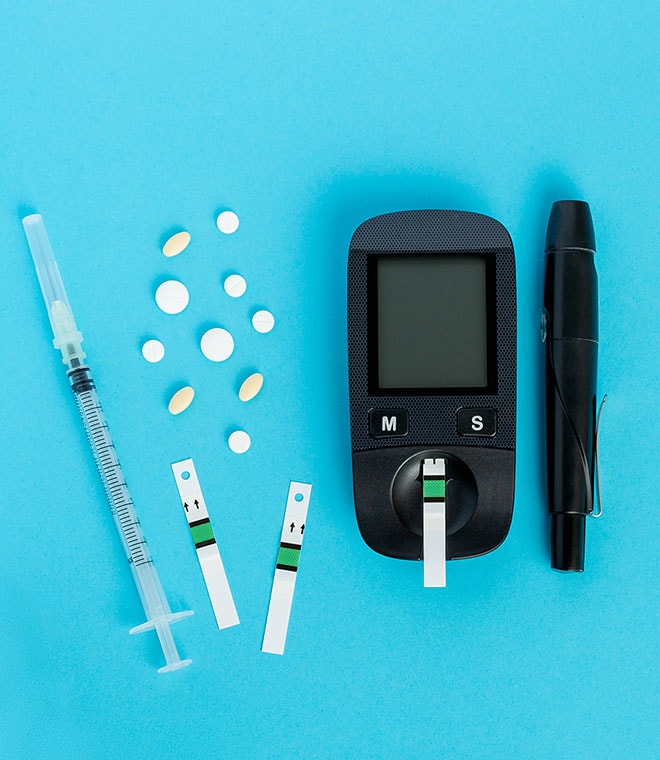Health
What are some common diabetic foot problems?
By Jenilee Matz, MPH May 20, 2024 • 7 min
In diabetes, the body loses its ability to control blood glucose (sugar) levels. Over time, this can lead to serious complications that can affect the whole body, including your feet and legs.
Why diabetes can lead to foot problems
Diabetes often causes foot issues. This is often because chronic high blood sugar levels can eventually lead to nerve damage, called diabetic neuropathy, which can cause symptoms in the feet and legs. In fact, at the time of a type 2 diabetes diagnosis, about 1 in 4 people already have some degree of neuropathy. The disease tends to affect both sides of the body, with symptoms starting in the feet. As nerve damage progresses, you may start to experience symptoms in your legs. Some people even develop symptoms in their hands and arms.
You may wonder what diabetic nerve pain is and what it feels like. Signs of neuropathy can vary. Some people describe it as intense pain or numbness in the feet while others have less intense symptoms or loss of balance. Diabetic nerve pain symptoms include:
- Pain in the toes, feet or legs
- Burning
- Tingling or a "pins and needles" sensation
- Numbness
- Weakness
Since neuropathy can cause you to lose the ability to feel pain and sensations of hot and cold, it can be difficult to notice if your foot is injured. What's more, high blood sugar levels in diabetes can harm blood vessels and reduce circulation to your feet. Poor circulation slows the healing of sores and blisters, which can lead to an infection or ulceration. Other possible foot complications from diabetes may include dry skin and calluses, which can lead to open sores and cracks.
What is a foot ulcer?
A diabetic foot ulcer is an open sore or wound that develops as a complication of diabetes. Without proper treatment, diabetic foot sores can lead to infection and, in serious cases, amputation (surgical removal of a limb). If you have an ulcer, see your healthcare provider.
How to care for your feet
There's no cure for neuropathy, and while treatments can help ease uncomfortable symptoms, there are ways to reduce your risk of developing neuropathy and foot problems in the first place. Keep your blood sugar in your target range as much as possible and take special care of your feet. Your healthcare provider may recommend that you see a podiatrist (foot care doctor) to stay on top of your foot health. They may also suggest you take these actions to protect your feet:
- Check your feet each day. Alert your healthcare provider if you have sores, redness, cracks, ingrown toenails, plantar warts, athlete’s foot, blisters or cuts that don't heal, a callus with dried blood inside, a foot infection that becomes black or foul-smelling or red, warm or painful skin. These could be signs of more serious issues, and prompt treatment may keep your problem from getting worse.
- Wear socks and shoes at all times. Choose comfortable socks and shoes that fit well to protect your feet from objects that can harm them. You can look for the American Podiatrist Medical Association (APMA) seal of approval, which means the product promotes foot health. Always check the insides of your shoes before putting them on to make sure they're smooth and free of debris and other objects. Try not to walk around barefoot. It’s important to choose shoes that fit properly and do not rub your feet when you walk. Shoes and inserts made specifically for people with diabetes are available. They feature additional support, stretchy and breathable materials, and wider toe boxes. These can be prescribed by your healthcare provider.
- Wash your feet every day with soap and warm water. Then dry your feet well, especially between your toes. Apply a thin coat of lotion, cream or petroleum jelly only on the tops and bottoms of your feet (do not apply it between your toes). Put cornstarch or talcum powder between your toes. Skin between the toes is often moist, but powder can keep the skin dry, which can help lower the chance of infections.
- Care for your toenails. If you can see, reach and feel your feet, trim your toenails regularly. Use toenail clippers and trim your toenails straight across, then gently smooth each nail with a non-sharp nail file or emery board. Ask your podiatrist to trim your toenails if you cannot see, feel or reach your feet, you have thickened or yellow toenails, or your nails curve and appear to grow into your skin.
- Check with a podiatrist about the best way to treat corns and calluses. Corns and calluses are thickened patches of skin that grow on your feet and can eventually become ulcers. A podiatrist may remove them for you or teach you how to gently smooth them. Do not try to treat corns and calluses yourself if you have neuropathy. See your healthcare provider instead.
- Protect your feet from heat and cold. Nerve damage can cause your feet to burn without you noticing. Always wear shoes on sand and pavement, keep your feet away from heaters and fire, and don't place a heating pad on your feet. In cold weather, wear lined, waterproof boots to keep your feet dry and warm.
- Increase circulation to your feet. Certain actions can improve blood flow to your feet. Put your feet up when sitting, wiggle your toes throughout the day, wear socks that aren't too tight, don't smoke and exercise regularly if your healthcare provider says it's OK.
- Schedule regular foot checkups. See your healthcare provider or podiatrist for foot checkups at least once a year or as often as recommended. They'll check your feet for early signs of nerve damage, poor circulation, or other foot problems.
Having diabetes increases your risk of nerve and circulation problems that can cause complications in your legs and feet. But following your diabetes treatment plan, caring for your feet and keeping up with checkups can help keep diabetes-related foot complications at bay. Work with your healthcare provider to learn how to take care of your feet.
Clinically reviewed and updated by Julie McDaniel, MSN, RN, CRNI, May 2024.
Sources:
- https://diabetes.org/about-diabetes/complications/foot-complications
- https://www.niddk.nih.gov/health-information/diabetes/overview/preventing-problems/foot-problems
- https://www.niddk.nih.gov/health-information/diabetes/overview/preventing-problems/nerve-damage-diabetic-neuropathies
- https://medlineplus.gov/diabeticfoot.html
- https://www.uptodate.com/contents/diabetic-neuropathy-beyond-the-basics
- https://diabetes.org/diabetes-and-your-feet
- https://diabetes.org/sites/default/files/2024-04/why-footwear-matters.pdf
- https://diabetes.org/sites/default/files/2024-04/12-steps-to-happier-feet.pdf



